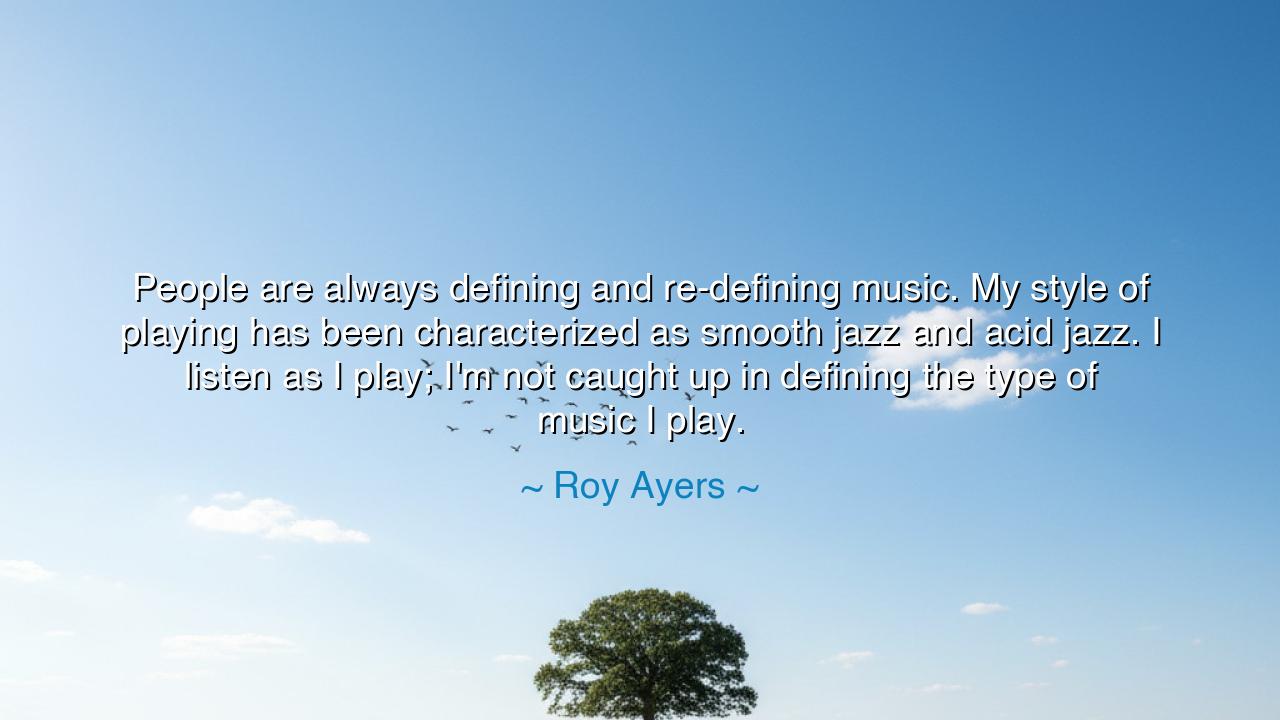
People are always defining and re-defining music. My style of
People are always defining and re-defining music. My style of playing has been characterized as smooth jazz and acid jazz. I listen as I play; I'm not caught up in defining the type of music I play.






Roy Ayers, the “Godfather of Neo-Soul,” once spoke these timeless words: “People are always defining and re-defining music. My style of playing has been characterized as smooth jazz and acid jazz. I listen as I play; I’m not caught up in defining the type of music I play.” In this utterance is a wisdom both simple and profound: that true artistry transcends labels. For Ayers, music was not a category to be placed in a box, but a living force, a river of rhythm and soul that cannot be confined by names or boundaries.
The ancients knew this truth well, though they spoke of it in other forms. The philosophers of Greece debated endlessly about what art should be, yet the music of the lyre still defied their words, touching hearts beyond definition. In India, the ragas were described as moods, times of day, breaths of the divine—not as “genres,” but as living expressions of the spirit. What Ayers declares is that music, like life, cannot be captured in a cage of language. It must be lived, experienced, and most of all, listened to.
Consider Ayers’ own career. From the 1970s onward, his vibraphone carried grooves that blended jazz, soul, funk, and later what critics called “acid jazz.” Yet Ayers himself refused the chains of definition. He played as he felt, flowing like water into whatever vessel the moment required. His work was sampled by hip-hop giants like A Tribe Called Quest and Erykah Badu—not because it fit a neat label, but because it pulsed with authenticity. His music survived across eras precisely because it was not confined by any single “category.”
So too in history do we see this lesson. Miles Davis, when confronted with questions about whether his music was jazz, cool jazz, or fusion, once answered, “Call it what you want.” He, like Ayers, refused to be trapped by labels. His “Kind of Blue” was not simply jazz—it was meditation, revolution, prayer, and innovation in sound. Had he been caught up in defining his art, he would not have dared to create something so enduring.
The meaning of Ayers’ words is thus clear: art that is bound to names will die with those names, but art that is free will live forever. The act of listening—to oneself, to others, to the spirit of the moment—is greater than the act of defining. When one listens deeply, creation flows naturally; when one obsesses over categories, the river dries up. Labels are for historians. Music, in its essence, belongs to the present, to the heartbeat, to the breath.
The lesson for us is profound: do not waste your energy seeking to define what you do so others may understand it. Live it, create it, embody it. The world may call it one thing today and another tomorrow—let them. Your task is not to conform to names, but to remain true to the act of creation itself. As Ayers says, listen as you play, whether your instrument is sound, or work, or life itself.
Therefore, let each soul embrace the freedom of expression. Do not fear the labels others place upon you. Do not cling to categories that confine your spirit. Instead, practice the art of deep listening—to your own heart, to the rhythm of the world around you. Create from that place, and let others call it what they will. For true strength is not in being defined, but in remaining undefinable.
Thus Roy Ayers’ words endure as a guiding light: “I’m not caught up in defining the type of music I play.” He teaches us that life itself is like music—ever-changing, flowing, impossible to capture in mere words. To live fully is to create without fear, to listen without judgment, and to move beyond definition into the boundless freedom of the soul.






AAdministratorAdministrator
Welcome, honored guests. Please leave a comment, we will respond soon